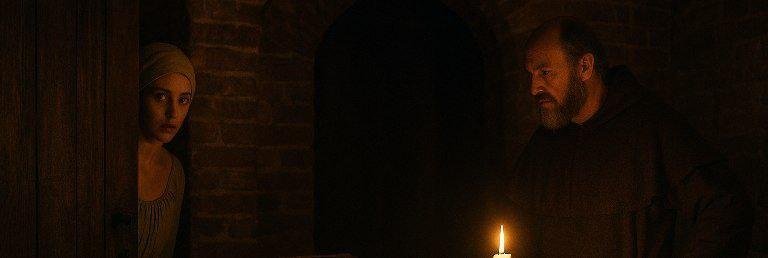“Holy Desires: Satire and Innocence in the Tale of Alibech and Rustico”

Introduction:
Giovanni Boccaccio’s The Decameron is a collection of stories that often use humor, irony, and satire to explore human nature, love, and morality. Among its most provocative tales is the story of Alibech and Rustico, told on the third day by Pamfilo. This tale humorously subverts religious ideals by mixing spiritual devotion with sexual awakening, resulting in a satirical narrative that critiques both religious hypocrisy and societal attitudes toward innocence and desire. The story's blend of humor and irony reveals deeper truths about human nature that still resonate with modern readers.
Summary:
In the tale, a naive young girl named Alibech from a wealthy Muslim family decides to become a Christian hermit. She travels into the desert in search of holiness and is eventually taken in by Rustico, a supposedly devout monk. Realizing her innocence, Rustico exploits her under the pretense of teaching her how to “put the Devil back into Hell,” a euphemism he invents to justify sexual intercourse. Alibech, unaware of the true nature of the act, believes she is performing a holy duty. After many such “lessons,” Alibech is eventually returned to the city and married off when her family dies. She leaves the desert, and the tale ends with a humorous note: in her town, it becomes a joke to say, “putting the Devil back into Hell” when talking about sex.
Analysis:
At its core, this tale is a satirical critique of religious hypocrisy and the human tendency to disguise personal desires as divine calling. Rustico, a man of the cloth, uses religious language to manipulate Alibech into satisfying his lust. The central theme is the exploitation of innocence by those in positions of authority, especially under the guise of religion. This reflects a common concern in 14th-century Europe—where the integrity of the Church was increasingly questioned due to corruption, greed, and moral failings among clergy.
The key characters, Alibech and Rustico, drive the narrative through a combination of innocence and deception. Alibech, though sincere in her desire to be holy, is completely unaware of the meaning behind Rustico’s instructions. Her trust and obedience make her a tragicomic figure—someone the audience laughs at but also pities. Rustico, on the other hand, is the embodiment of clerical hypocrisy, using religion for selfish ends. Their interaction is both humorous and unsettling, as it reflects a deeper issue of how power and ignorance can intersect.
Boccaccio uses irony as the primary literary device in this tale. The ironic contrast between Alibech’s belief that she is serving God and the reader’s understanding of Rustico’s manipulation creates much of the humor. The phrase “putting the Devil back into Hell” is a euphemism that satirizes religious language and points to the absurd ways sacred language can be twisted. Symbolism is also present—Alibech represents innocence and spiritual curiosity, while Rustico represents corrupt authority and base desires. Their “religious” union becomes a symbol of how far human desire can stray under the mask of holiness.
In the context of the 14th century, the tale reflects concerns about the Church’s moral decay and also reveals the limited understanding many people had about sexuality, especially women. Alibech’s ignorance is a direct result of being sheltered and uneducated about her body and desires—something that resonates even today, where discussions about sexual education and bodily autonomy remain relevant.
Personal Response:
This tale stood out to me for its boldness and humor. I was surprised by how openly Boccaccio discusses sex and religion in a time where both topics were highly sensitive. The mix of innocence and manipulation felt both funny and disturbing. I appreciated how the story uses comedy to critique serious issues like religious authority and sexual ignorance. While the story made me laugh, it also made me reflect on how easily people can be misled when they lack knowledge and trust blindly in authority figures.
Conclusion:
The tale of Alibech and Rustico is more than just a humorous anecdote—it’s a sharp social commentary wrapped in comedy. Through irony and satire, Boccaccio critiques religious hypocrisy and the exploitation of innocence. Despite being written in the 14th century, the story’s themes remain strikingly relevant. In an age where misinformation and power imbalance still persist, this tale reminds us to question authority, seek knowledge, and not confuse appearances with truth. Its clever use of language and enduring message make it a timeless piece worth revisiting.








